Numerous individuals choose to live with an overbite and avoid treatment. For instance, the late rock legend Freddie Mercury chose to retain and accept his extreme overbite. For others, addressing this problem entails just improving their occlusion (dentistry) in order to enhance their aesthetic look. Others, on the other hand, may need treatment to prevent consequences such as jaw problems and tooth and gum damage.
What is an Overbite? | What Causes an Overbite? | Types of Overbite | What issues does Buck teeth cause? | Fixing Buck Teeth
What is an Overbite?
 When the upper teeth protrude excessively beyond the lower teeth, this is referred to as an overbite or buck teeth. Most individuals have some degree of overbite, which is not obvious and has no effect on their biting or dental health.
When the upper teeth protrude excessively beyond the lower teeth, this is referred to as an overbite or buck teeth. Most individuals have some degree of overbite, which is not obvious and has no effect on their biting or dental health.
When the disease becomes sufficiently severe, it may result in irreversible tooth damage and temporomandibular joint dysfunction. Additionally, severe buck teeth may significantly change the face shape, resulting in psychological distress and poor self-esteem. Our dentist at Creative Smiles can permanently straighten your teeth and eliminate your overbite. Read about composite.
What Causes Buck Teeth?
While the reason is often inherited and may be handed down through generations, external influences can compel the teeth to shift.
Thumb Sucking
While it is natural for a child to sucking their thumb over the age of three or four and throughout the development of their permanent teeth, the pressure created by sucking the finger may cause the permanent teeth to come in at an irregular angle.
Pacifier
Sucking a pacifier, similar to thumb sucking, may induce it. Pacifier usage, as reported in the 2016 Journal of the American Dental Association, increases the risk of malocclusion.
Tongue-thrusting
When the tongue is pushed forward far enough in the mouth, it typically pushes the teeth forward as well. This often leads in an open bite malocclusion, but may sometimes result in buck teeth.
Teeth Grinding
Many individuals grind their teeth subconsciously. Teeth grinding is a pretty typical occurrence during sleep. Bruxism is often the source of an overbite, which may subsequently result in significant jaw and head discomfort. Teeth grinding may also result in early tooth enamel degradation, which can eventually result in tooth decay.
Missing or Impacted Teeth
Gaps between teeth or crowding may affect the front teeth’s alignment. When a tooth or two are missing, the remaining teeth begin to move, impacting the position of the other teeth.
Inadequate room to fit the teeth might also result in alignment problems. Know about align your teeth.
Genetics
Certain individuals are born with an uneven jaw or with a tiny upper or lower jaw. An overbite is a hereditary condition, which means that if your parents, siblings, or other relatives have one, you may also have one.
Tumors and cysts of the mouth or jaw
Tumors and cysts in the mouth or jaw may cause your teeth to become misaligned and your mouth and jaw to change form. This happens when chronic swelling or bone development in the top area of the mouth causes the jaw to move forward.
Additionally, prolonged nail biting and chewing on hard things such as pens, pencils, and other objects may result in an overbite.
Types of Overbites
Horizontal – This occurs when the upper teeth protrude beyond the lower teeth.
Vertical – It is a condition in which the upper teeth greatly overlap the lower teeth.
A patient may display symptoms of both vertical and horizontal overbite. Additionally, it might be classified as dental or skeletal. When teeth are creating buck teeth, it is dental. A skeletal ailment occurs when the jaw is the source of the problem.
What issues does Overbites can cause?
If left untreated, this condition may result in tooth loss, crowding, difficulty flossing and brushing, discomfort while chewing, crossbite, headaches, gum disease, or periodontal disease. It needs meticulous dental hygiene and frequent checkups to keep your mouth healthy.
Fixing Buck Teeth/Treatment for Overbite
In general, you will be treated with orthodontics since medicine alone will not be able to cure it. It is simpler to treat in youngsters since the child’s jaw is still developing. Adults, on the other hand, will struggle, as if they have been untreated up to this point. It will manifest itself with increasingly severe symptoms.
In any situation, the professional will evaluate the region and provide recommendations for therapy. These therapies may continue up to two years, and in some cases, longer.
Your orthodontist (one of the several medical specialties) may prescribe the following dentistry treatments:
Children:
- Dental Braces
- To improve the jaw’s position, a growth modification device is used.
- Baby teeth are extracted to create way for the permanent ones to develop.
- Retainer (orthodontics)
Adults:
- Braces – the most effective way for correcting this issue.
- Tooth extraction – Your orthodontist may attempt to avoid this surgery and will only recommend it in extreme cases.
- Surgery – Surgery is indicated for skeletal-type disorders.
Creative Smiles can help treat your overbite and get you the smile you always wanted.
Avoid living with an overbite if there are alternatives. Make an appointment now to explore what it will take to have you smiling brightly and enjoying optimal dental health.
Published on February 15, 2022, Updated on March 26, 2022
